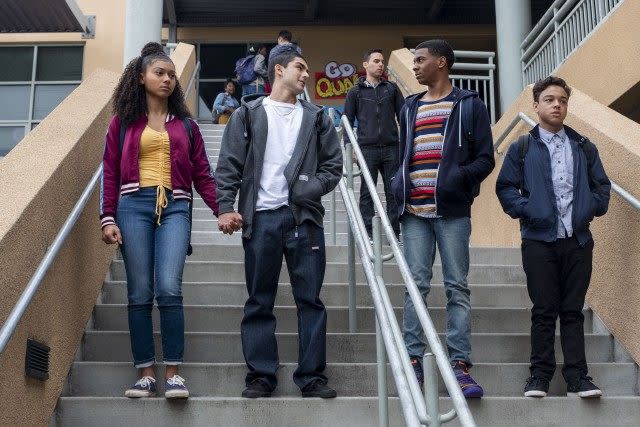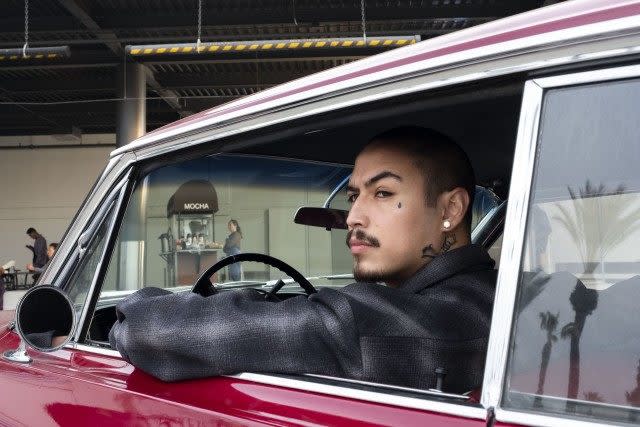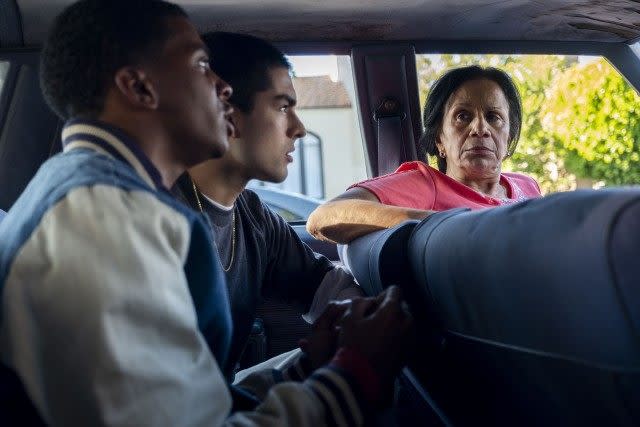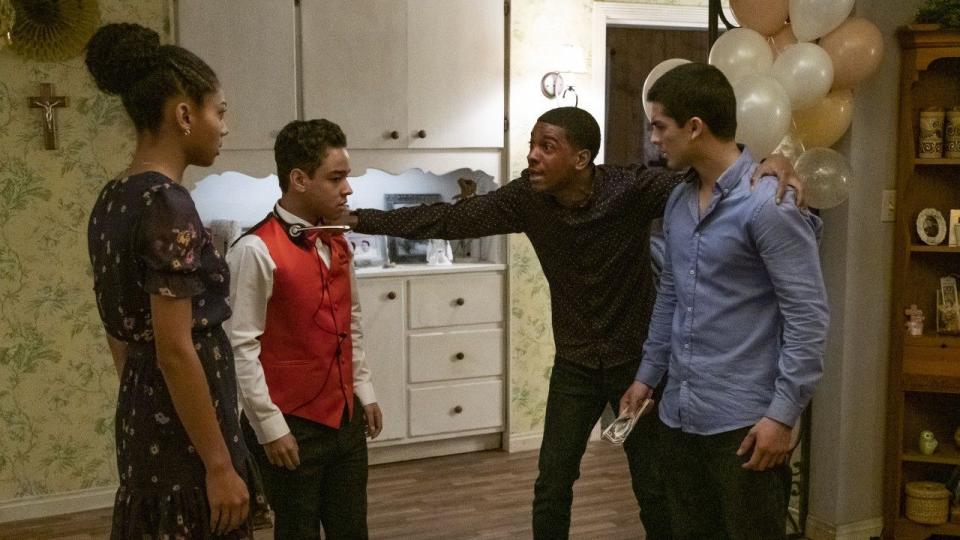'On My Block' EPs Talk Season 2's Biggest Moments and That Jaw-Dropping Cliffhanger (Exclusive)
Warning: Spoiler alert! Do not proceed if you haven't watched season 2 of On My Block.
On My Block returned for its second season on Friday, and the acclaimed Netflix series paid off season one's shocking cliffhanger in a major way, with an emotional roller coaster of a sophomore season full of big laughs and even bigger drama. The show follows a tight-knit crew -- Monse Finnie (Sierra Capri), Cesar Diaz (Diego Tinoco), Ruby Martinez (Jason Genao) and Jamal Turner (Brett Gray) -- as they navigate life, love and loyalty in their inner-city Los Angeles neighborhood.
The friends have weathered a lot already in their freshman year of high school, and season two picks up in the aftermath of a gang-related shooting, which left Ruby injured and their friend, Olivia (Ronni Hawk), dead -- and that's just the physical trauma. Along with school dances and family tension, season two also sees the "fam" facing survivor's guilt and post-traumatic stress as they struggle to move with their lives. For Eddie Gonzelez and Jeremy Haft -- who co-created the show along with Awkward showrunner Lauren Iungerich -- it was an important story to continue telling.

"I think we had to live up to pretty much what the promise of season one was," Gonzalez told ET of shaping season two. "When you end on a cliffhanger like that, people expect you to come back strong, and there are just different expectations."
"When [we were] first creating the show, we were proud of it, we were excited with what we were creating, but there are no expectations, we're a little show with a small budget, no one knows anything about us," he added. "But once it blew up in season one, we knew we had to come back, we had to answer a lot of questions. We had to make sure we wouldn't let anybody down and above all else, we had to be true and authentic to what happened in that neighborhood."
Read on for more from Gonzalez and Haft about the biggest moments from season two, that jaw-dropping finale and what's possibly to come if the show gets picked up for a third season!
ET: Obviously a huge part of season two focuses on the fam, and Ruby, in particular, dealing with the aftermath of the shooting at the quinces and Olivia's death. One thing that I really appreciated was that it wasn't treated as a "very special episode," where they talk about their feelings and then we move on. The survivor's guilt and the triggers are something that recur for Ruby and his friends throughout the season. What were your motivations going into this season as far as telling that story?
Eddie Gonzalez: I think you hit it on the nose when you said it shouldn't be a very special episode, and you're absolutely right. Because here's the thing, unfortunately, I grew up in neighborhoods like that. And you would see what violence does to a neighborhood. It's not just this random act that happens, you sweep it up and you move on. It has a long-lasting effect, a life-changing effect. So to do something where we would address it for just one episode and then forget about it would be just really a horrible thing to do, not just to the audience but to the true nature of those kinds of stories. We wanted to make sure that you go through the stages of grief.
I saw this firsthand growing up. I was around people that were caught in drive-bys. It's heartbreaking, and it's one of those things that you just can't heal overnight. So we wanted to be able to do justice to that story.
Absolutely. I think another thing that's so powerful about that storyline was the male characters, in particular, allowing themselves to cry and be vulnerable with each other. I think that's something that's rare and really special to see on a show like this. Is that something that was important to you guys to show as the characters worked through their emotions?
EG: It was very important, especially when you look at the two characters [of Ruby and Cesar]. These are best friends, and it's because of one inaction -- Cesar's inaction -- that led to this. And [in the season two premiere] he hasn't seen Ruby, it's been three weeks and he doesn't know how Ruby is gonna respond to him. So I think we tried to portray that as realistically as possible.
Lauren, our partner and co-creator on this, did an amazing job directing that episode and that moment is heartbreaking because it does leave you wondering, what is Ruby gonna do when he sees him? Is he gonna turn his back on him? Is he gonna punch him? What's he gonna do? And what he does, in that moment, he absolves them of his guilt.
Jeremy Haft: Cesar had a choice in season one, whether to kill Latrelle or not kill Latrelle. The easy choice that would have kept Olivia alive, that would have not gotten Ruby shot, was to go and kill someone. And he searched his soul and he couldn't do that... You see that Ruby understands that his friend didn't kill someone, and that was the right choice for Cesar. It's the hard choice because it led to the death of someone else, but you really see the moral quandary these poor kids are put in in these tougher neighborhoods.
EG: Growing up with that... when you would see neighborhoods like mine portrayed on TV, it was always bleak. The characters weren't humanized, everybody was one-dimensional. I can tell you from firsthand experience growing up with characters like this, everyone is complex. And there are multiple sides and there's gray to characters, it's not just black and white. And that's what we try to do with all our characters.
That is one of the best parts of a show like this getting a second season and getting the chance to tell more stories is, we can dive deeper into the lives of not just the main characters, but their friends and family as well. I loved learning more about Oscar, aka Spooky (Julio Macias), and Chivo (Emilio Rivera), and diving deeper in Jasmine's home life and learning why she is who she is. Who were some of the characters that you were excited to spend more time with in season two?
JH: I'll start with Jasmine. She was hilarious in season one, and Jessica Marie Garcia's a hilarious actress. She's amazing. But while she was super funny in season one, we didn't want to just create a stereotype or a character of the funny girl, or the comic relief. So we wanted to show the layers beneath her and show that she's a real person. And to a certain degree, the comedy, the joking around is the suit of armor almost to protect her, the stuff she's gone through.
EG: I think what it comes down to is really humanizing these characters. Not just the core four, but the supporting cast. Every single person, from Jamal's parents to the coach, everybody, there are more layers to these people. My favorite character to write for is Spooky. And when you see that relationship with his brother, you really get to see what that family's like without going fully into what the family was. There's an episode in season one, when they're sitting on the beach talking [and Oscar says to Cesar], "Even when Mom was there, Mom wasn't there." That's all you need to say to get it. There's that [saying], "what is understood doesn't need to be explained." And that's what it is in that moment, just two lines of dialogue, you get what's going on.

JH: With Oscar, he's the head of the Santos, he's a scary, tough guy, but in season one and season two, you see he's not a stereotype. Being in a gang, there's a gray area, and there's reasons for it. He didn't just jump into a gang one day [like], "Oh, this'll be a lot of fun, I'm gonna join the gang." You see that he became a member of the Santos to protect his brother, to help his family. He didn't have a choice. These characters are not stereotypes. They're gray and there's reasons for everything.
There were also some really great moments from the parents this season, from Ruby's mom, Geny (Paula Garces), handling -- or not handling, rather -- the Mario pregnancy storyline, to Monse's father, Monty (Reggie Austin), dealing with her newfound relationship with her mother. Was that something that excited you about casting those parts back in season one, knowing that you would get the chance to tell bigger stories with those characters in the future?
JH: Absolutely. I mean, we really love -- Jamal's parents [played by Eme Ikwuakor and Raushanah Simmons] are terrific actors. And Monse's father is amazing. There's one particular scene that's something that we talked about a lot, when Cesar is in trouble, and you have Monse's father sitting there with Jamal's father at Jamal's father's restaurant trying to save Cesar. That you had Cesar, who's a Latino, and then you had two African-American men sitting together trying to figure out how to save him amidst this gang violence from the Prophets, that was something that was important to us, to kind of show, [despite] the differences, that people are people, regardless of race and color... And that was one of the moments that we found really special.
EG: What's interesting about the actors is -- I agree with Jeremy there, they're great actors. But they handle comedy as well as they do drama. Look at Peggy Blow, who plays [Ruby's] abuelita. She's fantastic in some of these dramatic moments. You saw it in season one, you see it again in season two.

I look at Emilio Rivera, who played Chivo, who is, I would probably say, hands-down my favorite actor I've ever worked with, because he is a consummate professional and incredibly generous with everyone on the set, in terms of advice and just listening to people. He's fantastic in the role this year and it's a stretch from what he's done in the past and he knocks it out of the park. He's great.
Family issues affect all of the main characters in season two. For Monse, a big part of the season is meeting her mother, testing out life in Brentwood, and ultimately coming to terms with that part of her life and who that person is. Can you talk a little bit about crafting that storyline and what you were hoping to show there?
EG: I think it's a story that's actually familiar to a lot of the kids that are watching the show. You're growing up in a biracial family, you don't understand the other side of your family. There's someone who has left, and there's this longing. And I think it's normal for a child to have this longing for this person and to idealize this person that they didn't grow up with. And now, she finally has that opportunity to meet her and she's so -- in Monse's words -- disappointing, more than anything else.
I think she has to go through that because, if you notice, Monse goes on this big journey where, for season one and season two, she has been this selfless person. She's given everything to the core four, she's given everything to Cesar, and she needed to go through this heartbreak with her mom. She needed to go through the heartbreak with the friends to finally get to a point where it's time to be Team Monse. This is a female empowerment story, and that's where she's heading for, hopefully, if we get a season three.

Let's take that opportunity to dive into the finale, which was a wild ride from start to finish -- from the Oscar/Cesar fake out to the Prophets bust to the gang getting snatched in the final moments. How did you guys go about crafting that final episode? Was this always the plan to end season two?
EG: Our mandate was, we have to top the cliffhanger of season one. [laughs] No, actually, it was more than just that. I mean, there's a lot of thought that goes into this, because obviously to write that ending, we have to know where we're going for season three. And we haven't gotten a pickup for season three. We hope we get it. We have an idea of where we are going in season three.
So to that end, we wrote to this kind of wild and unexpected ending to season two, and that went through a lot of machinations. I mean, there was a lot. Breaking episode 10, the three of us, Lauren, Jeremy and I, we spent a lot of time specifically on the final three or four minutes of that. Because it's very, very difficult. Lauren did a great job with Monse's speech when she walks away and again, it speaks to her empowerment, it speaks to where she's going on her journey. But it went through different machinations in terms of how we were going to end the episode and the season.

'On My Block' co-creators Jeremy Haft, Lauren Iungerich and Eddie Gonzalez
Along those lines, there seems to be a few hints in season two that tease at some possible storylines that could be coming in season three -- including what is sort of a throwaway mention about Monse's dad and his family being linked to the Prophets in the past. Is that something that may ultimately resurface?
JH: I would say you're very, very intuitive. And also, at the same time, you can't write the end of season two if you don't know where you're going with season three. So we have a lot planned, we're really excited and I guess, fingers crossed, so to speak. You hit it on the nose, there are some throwaway lines that if you go back and rewatch the series, or rewatch those last several episodes, you can kinda see where we're going. It's obviously better left unsaid right now until we get a season three, but yes, that's exactly what we were aiming to do.
On My Block season 2 is streaming now on Netflix.
RELATED CONTENT:
'On My Block' Star Sierra Capri Opens Up About 'Life-Changing' Season 2 (Exclusive)
'One Day at a Time' Cast Is 'Optimistic' About Finding a New Network After Netflix Cancellation
Rita Moreno Hopes 'One Day at a Time' Will Find a New Home (Exclusive)
Related Articles:


